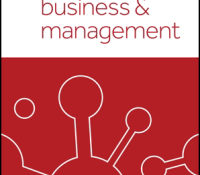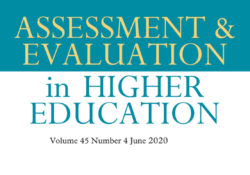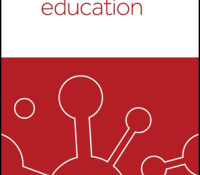tandfonline.com har udgivet en rapport under søgningen “Teacher Education Mathematics”: Abstract Formulae display:?Mathematical formulae have been encoded as MathML and are displayed in this HTML version using MathJax in order to improve their display. Uncheck the box to turn MathJax off. This feature requires Javascript. Click on a formula to zoom. Abstract The purpose of this research is to analyze the influence of financial literacy and materialism on the savings decision of Indonesia’s generation Z. This study was motivated by the country’s agenda to achieve financial inclusion and develop human resources throughout the nation. We distributed questionnaires to 430 university students to measure their financial literacy score and materialism level, as well as the savings rate of every respondent. Through a series of regression analyses, we find that (i) age,… Continue Reading →
Like this:
Like Loading...
tandfonline.com har udgivet en rapport under søgningen “Teacher Education Mathematics”: ABSTRACT ABSTRACT While scholars have proposed different models of language assessment literacy (LAL), these models have mostly comprised prescribed sets of components based on principles of good practice. As such, these models remain theoretical in nature, and represent the perspectives of language assessment researchers rather than stakeholders themselves. The project from which the current study is drawn was designed to address this issue through an empirical investigation of the LAL needs of different stakeholder groups. Central to this aim was the development of a rigorous and comprehensive survey which would illuminate the dimensionality of LAL and generate profiles of needs across these dimensions. This paper reports on the development of an instrument designed for this purpose: the Language Assessment Literacy… Continue Reading →
Like this:
Like Loading...
tandfonline.com har udgivet en rapport under søgningen “Teacher Education Mathematics”: Abstract Abstract There is an increasing focus on notions of feedback in which students are positioned as active players rather than recipients of information. These discussions have been either conceptual in character or have an empirical focus on designs to support learners in feedback processes. There has been little emphasis on learners’ perspectives on, and experiences of, the role they play in such processes and what they need in order to benefit from feedback. This study therefore seeks to identify the characteristics of feedback literacy – that is, how students understand and can utilise feedback for their own learning – by analysing students’ views of feedback processes drawing on a substantial data set derived from a study of feedback in… Continue Reading →
Like this:
Like Loading...
eric.ed.gov har udgivet: This package contains student and teacher handbooks and a report summarizing a project during which the handbooks were developed as part of a numeracy education course for adult basic and literacy education students. Discussed in the project report are the following: development of the course’s 7 numeracy education units, field testing of the units with 8 teachers and 110 students, subsequent revision of the units, and production of a math literacy curriculum and companion student and educator handbooks. Included in the student handbook are a 22-item bibliography, brief discussion of the curriculum’s purpose and scope, and instructional units containing background information and learning activities on the following topics: reading, writing, and thinking about numbers; looking at numbers; estimating and rounding numbers; using calculators; measurement and its uses;… Continue Reading →
Like this:
Like Loading...
eric.ed.gov har udgivet: Turning everyday activities such as baking into scientific activities is more than just fun: it is important for our children’s futures. Science investigations provide an opportunity for children to learn about scientific concepts and listen to their peers, family, and community members, and to respond to their questions or ideas. It also provides them with an opportunity to ask and answer their own questions, build persistence, and improve their problem-solving and self-regulation skills, which are essential for academic success. As the world becomes increasingly science- and technology-oriented, all children need to become proficient in science, whatever their chosen field. STEM (science, technology, engineering, and math) education has become a national priority, and even early childhood teachers are expected to increase the quantity and quality of the science… Continue Reading →
Like this:
Like Loading...
eric.ed.gov har udgivet: Tackling Literacy: A Collaborative Approach to Developing Materials, for Assessing Science Literacy Skills in Content Classrooms through A STEM Perspective Link til kilde
Like this:
Like Loading...
eric.ed.gov har udgivet: This action research study investigated the impact of teaching physics using a disciplinary literacy framework for instruction across all units in one academic year. Through a suite of vocabulary strategies and lessons that encourage students to write, speak, draw, mathematically translate, and design experiments, students learn to do physics by approximating problems and tasks like physicists. The data from this study suggests that students who exhibit these physicist-like disciplinary literacy behaviors may perform better on math-based assessments so long as they employ disciplinary literacy strategies while problem solving. By teaching via a disciplinary literacy framework, the classroom may become more student-driven where disciplinary literacy behaviors are observable which may result in higher scores on teacher evaluation instruments that favor student-driven instruction. While students that exhibit disciplinary literacy… Continue Reading →
Like this:
Like Loading...
tandfonline.com har udgivet en rapport under søgningen “Teacher Education Mathematics”: ABSTRACT ABSTRACT This study examined how teachers relate literacy teaching to their ordinary subject teaching in professional development settings. The study is conducted within the large Swedish professional development program the Literacy Boost (in Swedish “Läslyftet”), which can be viewed as an example of an international focus on reading ability beyond early and beginning reading. Such a focus may be well-grounded, but it also raises concerns of how teachers of different school subjects are addressed in such programs. The findings of this study show that participating teachers express four approaches of relating literacy teaching to subject teaching, indicating different types and degrees of coherence between professional development content and teachers’ teaching practice. While all teaching activities described by teachers aimed… Continue Reading →
Like this:
Like Loading...
eric.ed.gov har udgivet: There is a dearth of literature that use research design for causal inference that estimate the effect of information and communications technology (ICT) programs on literacy outcomes in early primary, particularly in Sub-Saharan Africa. There are several programs that have used ICT at a large scale, including Los Angeles, Peru, Nicaragua, Rwanda and an ongoing program in Turkey. Seldom have the studies directly estimated the effect of the ICT program on learning, as the measures used have typically been a middle level of the causal chain (Strigel & Pouezevara, 2012). Mobile phones are increasingly available in the market, and several authors argue that mobile learning is an increasingly ideal way to increase outcomes at scale (UNESCO, 2012; GSMA, 2012; McKinsey & Co., 2012; Vosloo, 2012). There are… Continue Reading →
Like this:
Like Loading...
tandfonline.com har udgivet en rapport under søgningen “Teacher Education Mathematics”: Abstract Abstract This study explores what opportunities for critical literacy work that can be distinguished in the practices of an emerging digitalised classroom and how teachers and students make use of these. Observations were conducted over the course of one semester in three subjects in a Swedish class of 13–14-year olds using individual tablets. The findings presented as thick descriptions suggest that different kinds of opportunities to develop critical literacy evolve in various activities and digital technologies become a resource in students’ work. However, these opportunities mainly occur in peer interactions outside the visible control of the teacher and never develop into further critical reflections. The study concludes that a deliberate emphasis on critical literacy work in the design of… Continue Reading →
Like this:
Like Loading...




